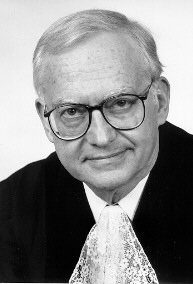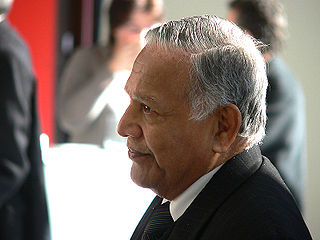
The Treaty on the Non-Proliferation of Nuclear Weapons, commonly known as the Non-Proliferation Treaty or NPT, is an international treaty whose objective is to prevent the spread of nuclear weapons and weapons technology, to promote cooperation in the peaceful uses of nuclear energy, and to further the goal of achieving nuclear disarmament and general and complete disarmament. Between 1965 and 1968, the treaty was negotiated by the Eighteen Nation Committee on Disarmament, a United Nations-sponsored organization based in Geneva, Switzerland.

International Physicians for the Prevention of Nuclear War (IPPNW) is a non-partisan federation of national medical groups in 63 countries, representing doctors, medical students, other health workers, and concerned people who share the common goal of creating a more peaceful and secure world free from the threat of nuclear annihilation. The organization's headquarters is in Malden, Massachusetts. IPPNW was awarded the Nobel Peace Prize in 1985.

Legality of the Threat or Use of Nuclear Weapons [1996] ICJ 2 is a landmark international law case, where the International Court of Justice gave an advisory opinion stating that there is no source of law, customary or treaty, that explicitly prohibits the possession or even use of nuclear weapons. The only requirement being that their use must be in conformity with the law on self-defence and principles of international humanitarian law.
Trident Ploughshares is an activist anti-nuclear weapons group, founded in 1998 with the aim of "beating swords into ploughshares". This is specifically by attempting to disarm the UK Trident nuclear weapons system, in a non-violent manner. The original group consisted of six core activists, including Angie Zelter, founder of the non-violent Snowball Campaign.
Ronald King Murray, Lord Murray, PC was a Scottish Labour politician and judge who rose to be a Senator of the College of Justice in 1979.
Opinio juris sive necessitatis or simply opinio juris is the belief that an action was carried out as a legal obligation. This is in contrast to an action resulting from cognitive reaction or behaviors habitual to an individual. This term is frequently used in legal proceedings such as a defense for a case.

The Nuclear Age Peace Foundation was founded in 1982, and is composed of individuals and organizations worldwide who support worldwide efforts to abolish nuclear weapons. The Nuclear Age Peace Foundation is a non-profit, non-partisan international education and advocacy organization. It has consultative status to the United Nations Economic and Social Council and is recognized by the UN as a Peace Messenger Organization.

Philippe Sands, QC is British and French lawyer at Matrix Chambers, and Professor of Laws and Director of the Centre on International Courts and Tribunals at University College London. A specialist in international law, he appears as counsel and advocate before many international courts and tribunals, including the International Court of Justice, the International Tribunal for the Law of Sea, the European Court of Justice, the European Court of Human Rights and the International Criminal Court.

Stephen Myron Schwebel, is an American jurist, counsel and independent arbitrator. He serves as Judge of the World Bank Administrative Tribunal and as a member of the U.S. national group at the Permanent Court of Arbitration. Previously, he served as President of the World Bank Administrative Tribunal, as President of the International Monetary Fund Administrative Tribunal (1993–2010), as President of the International Court of Justice (1997–2000), as Vice President of the International Court of Justice (1994–1997) and as Judge of the International Court of Justice (1981–2000). Prior to his tenure on the World Court, Judge Schwebel served as Deputy Legal Adviser to the U.S. Department of State (1974–1981) and as Assistant Legal Adviser to the U.S. Dept. of State (1961–1967). He also served as a professor of law at Harvard Law School (1959–1961) and Johns Hopkins University (1967–1981). Judge Schwebel is noted for his expansive opinions in momentous cases such as Legality of the Threat or Use of Nuclear Weapons, Military and Paramilitary Activities in and Against Nicaragua and Oil Platforms .
Dr. Randall Caroline Forsberg led a lifetime of research and advocacy on ways to reduce the risk of war, minimize the burden of military spending, and promote democratic institutions. Her career started at the Stockholm International Peace Research Institute in 1968. In 1974 she moved to Cambridge, Massachusetts to found the Institute for Defense and Disarmament Studies as well as to launch the national Nuclear Weapons Freeze Campaign.

Jonathan Granoff is an American lawyer, screenwriter and lecturer, widely known as President of the Global Security Institute.

The Martens Clause was introduced into the preamble to the 1899 Hague Convention II – Laws and Customs of War on Land. The clause took its name from a declaration read by Friedrich Martens, the delegate of Russia at the Hague Peace Conferences of 1899. It reads as follows:
Until a more complete code of the laws of war is issued, the High Contracting Parties think it right to declare that in cases not included in the Regulations adopted by them, populations and belligerents remain under the protection and empire of the principles of international law, as they result from the usages established between civilized nations, from the laws of humanity and the requirements of the public conscience.
A nuclear weapons convention is a proposed multilateral treaty to eliminate nuclear weapons. This might include prohibitions on the possession, development, testing, production, stockpiling, transfer, use and threat of use of nuclear weapons, such as those in the Treaty on the Prohibition of Nuclear Weapons, along with provisions for their verified elimination. It could be similar to existing conventions outlawing other categories of weapons, such as biological weapons, chemical weapons, anti-personnel mines and cluster bombs.

The International Luxembourg Forum on Preventing Nuclear Catastrophe — is an international non-governmental organisation uniting leading world-renowned experts on non-proliferation of nuclear weapons, materials and delivery vehicles.

United Nations Security Council resolution 984, adopted unanimously on 11 April 1995, the Council gave assurances to non-nuclear weapon states that were parties to the Nuclear Non-Proliferation Treaty (NPT) against the threat of nuclear proliferation.

Alyn (Alan) Ware is a New Zealand peace educator and campaigner in the areas of peace, non-violence, nuclear abolition, international law, women’s rights, children’s rights and the environment. He has served as the Global Coordinator for Parliamentarians for Nuclear Nonproliferation and Disarmament since it was founded in 2002.
The Humanitarian Initiative is a group of states that evolved within the framework of the Nuclear Non-Proliferation Treaty (NPT) and nuclear weapons diplomacy more widely. 159 states subscribed to the last iteration of the initiative's Joint Statement in 2015. Since 2013, it led to a series of conferences exploring the Humanitarian Impact of Nuclear Weapons, culminating in the Humanitarian Pledge, issued by the Austrian Government, to "fill the legal gap for the prohibition and elimination of nuclear weapons". The Pledge has been endorsed by 108 governments as of 1 June 2015. The Humanitarian Initiative is seen as a direct answer to the lack of progress in nuclear disarmament.
Action AWE is a grassroots activist anti-nuclear weapons campaign/group launched in February 2013. Its aim is to increase and activate public opposition to the UK Trident nuclear weapons system, and depleted uranium warheads manufactured at AWE Burghfield, along with AWE Aldermaston.














